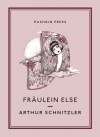Lagraziana's Kalliopeion
This is a blog about my reads as well as everything related to them.
My taste is for good quality literature - old and new. Some of it I review here or on my main book blog Edith's Miscellany.
Arthur Schnitzler: Fräulein Else
Arthur Schnitzler's Fräulein Else, a first-person stream of consciousness narrative like None but the Brave (Leutnant Gustl), was first published in 1924 and received immediate public acclaim.
The plot is simple. It’s 3 September 1896. The adolescent woman Else is staying in a hotel in San Martino di Castrozza in Southern Tyrol, a fashionable summer holiday resort in the then Austro-Hungarian Empire, today in Italy, with her well-to-do aunt and cousin. In the afternoon she receives a telegram from her mother informing her that her father, a lawyer and gambler, needs 30,000 guldens in order to return embezzled money and to avoid prison as well as humiliation. Since there is no other hope for the family, Else is asked to approach the rich art dealer Dorsday, a family acquaintance, present at the hotel and to make him lend her father the necessary money. The young woman follows her mother’s wishes, but Mr. Dorsday requires something in return that Else is reluctant to give: he wants her to take off her clothes and pose naked in front of him that night. The request plunges the young and inexperienced Else into a deep inner tumult. She considers all possibilities that are left to her, acquiescence, rebellion, even suicide. When a second telegram arrives from her mother in the evening telling her that the amount needed is 50,000 guldens, the young woman takes her decision. She goes down to the lobby with nothing but her fur coat on and takes it off in front of all hotel guests including Mr. Dorsday, so everybody will think that she suffered a nervous breakdown. To soothe her nerves she had taken a dose of veronal, a strong sedative and hypnotic very common at the time, or more than just one dose that shows effect when Else regains her hotel room and her bed where the story and Else’s stream of consciousness end.
I enjoyed reading this novella very much although it’s set in a world of yesterday, a world before the two great wars of the twentieth century and long before the sexual revolution of the 1960s. Despite all it feels very modern. In any case, it’s a masterpiece of Austrian literature and it deserves being read more often than it is today.
A longer version of this review is available on my blog at: http://edith-lagraziana.blogspot.co.at/2013/02/fraulein-else-by-arthur-schnitzler.html
 1
1










